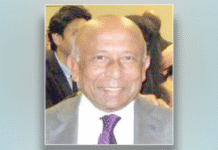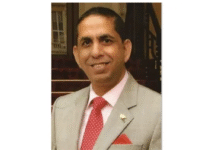Throughout the last seven years or so, a constant unmistakable sense of pervasive unremitting fear of forced disappearance—-which invariably means death—-has been haunting the people who are not supporters of the ruling Awami League headed by Prime Minister Sheikh Hasina. With law and order in dire straits in Bangladesh, the panic-ridden body politic apprehends the extreme tragedy of murder from enforced disappearance like higher-ranking opposition BNP leader and former Whip Iliyas Ali MP or Chowdhury Alam (another opposition BNP leader), custodial death of opposition BNP leaders like A. Baker.
Abductions and murders thus are all around — which have been the usual phenomenon in the left-in-the-lurch, dehumanising dystopian milieu, which has witnessed since 2009, umpteen such incidents victimising mostly leaders and activists of the main opposition BNP and its alliance partners, including others. The mass psyche is now gripped by the endless dread of being kidnapped anytime anywhere as law enforcement is not in sight, though law enforcers are unfailingly hyperactive when it comes to crackdown on the political dissent organising a rally or public assembly. These began years back, and the US HR Report found 101 deaths in custody in 2012, as published on 21 April 2013.
Apprehensive of the white terror of abduction, eminent jurist Dr Kamal Hossain on 15 September 2012 expressed fears for “his forced disappearance” for speaking the truth. “I may be a victim of forced disappearance anytime,” he told a meeting of Odhikar and the Asian Federation against Involuntary Disappearances held at Bangladesh Institute of Law and International Affairs. This was reverberated by the late lamented doyen of our journalism, A B M Musa. Quoting the remark, Rashed Khan Menon, MP, said that “given the prevailing situation in the country, “such an anxiety is not unusual”.
The Daily Dinkal reported on 17 August 2016, with the escalation of forced disappearances, fear persists as success rate of recovering alive the victims of disappearance is not considerable as abductees are usually found dead. According to Daily Inqilab dated 21 May 2016, plainclothes men claiming to be Detective Branch Police officials, picked up a modest vendor named Deen Islam, 25-year old son of widow Sabia Begum of Bhelanagar, Narsingdi. Within hours his lifeless body was found in the local hospital. His mother said her son was beaten to death by the kidnappers as he could not pay them a large amount of money.
We wonder how dare the Police, for that matter the government, violate the Apex Court ruling? Observing that any arrest by law enforcers in plainclothes is alarming, the Supreme Court on 25 May 2016 said that law enforcers will have to be in uniform while arresting anyone. A four-member bench of the Appellate Division, headed by Chief Justice S K Sinha, came up with the observation after hearing a petition filed by the state.
Besides, the Supreme Court, on the same date, upheld a High Court order that sought reform of provisions of arrest without warrant and interrogation on remand under Sections 54 and 167 of the Criminal Procedure Code (CrPC). A four-member bench of the Appellate Division, headed by Chief Justice SK Sinha, passed the order. Barrister Sara Hossain, lawyer for the Bangladesh Legal Aid and Services Trust (BLAST), said the court rejected the appeal of the state and would issue guidelines in the full judgment. The Appellate Division also upheld the 15 directives of the HC. The court also said Sections 54 and 67 of the CrPC are contradictory to Sections 31, 33 and 35. [Vide The Independent bd.com/printversion/details/ 44951 dated 25 May 2016]
The Bangladesh Protidin on 20 May 2016 reported that those who disappear in different areas across the country are found dead in the Shalbon of Gazipur, not far from Dhaka city. In the last two and a half months 90 cadavers were found packed in rucksacks.
While in opposition the Awami League demanded that the dreaded RAB be disbanded, and promised “zero tolerance” for extrajudicial killings after it came to power in 2009. But now its leaders at times even refuse to acknowledge that security forces are responsible for human rights violations. Prime Minister Sheikh Hasina praised law enforcement agencies for their actions against those responsible for violence during strikes and blockades, saying that “members of the police force along with people are discharging their duties sincerely in keeping law and order.” She said nothing about reports of extrajudicial killings, ensuring law enforcement officers act within the law, or holding abusers accountable.
Over four decades back, under identical chaotic circumstances incidentally during another AL regime, on 14 March 1973, out of extreme frustration a well-loved columnist, Nirmal Sen, wrote his epic article in the now defunct Bengali daily Dainik Bangla. Entitled “Aami swabhabik mrityur guarantee chai” [I want to die a natural death], Sen condemned impunity, demanded proper application of the rule of law and due unbiased prosecution.
We echo his words—-let Bangladeshis die a natural death.
Source: weeklyholiday









